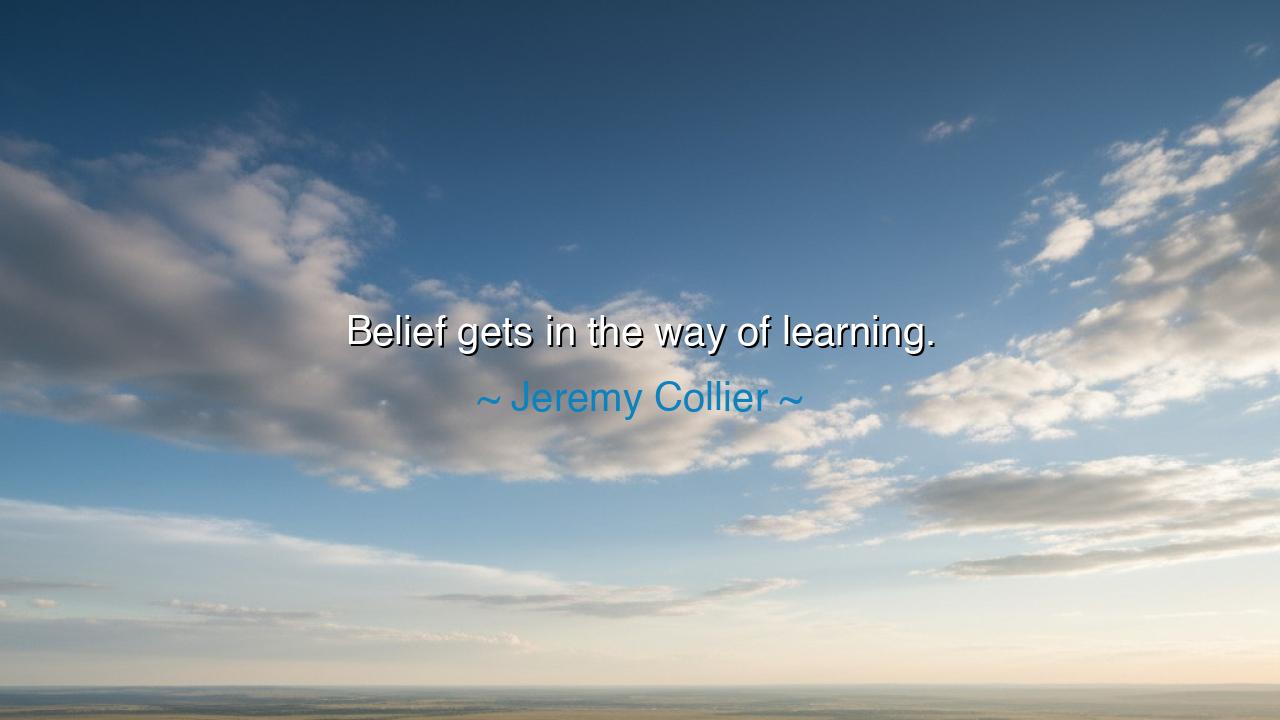
Belief gets in the way of learning.






In a tone that pierces through time, Jeremy Collier once declared, “Belief gets in the way of learning.” Simple though it may sound, this sentence strikes at one of the oldest tensions in the human soul—the conflict between certainty and discovery. Collier, a preacher, moralist, and thinker of the seventeenth century, understood that conviction can be both the torch that guides and the fire that blinds. His words are a reminder that knowledge cannot enter a vessel already full. The mind that clings too tightly to belief—to dogma, to preconception, to the pride of being right—loses the capacity to learn, to wonder, to grow.
The origin of this quote is found in Collier’s larger reflections on education, religion, and moral philosophy. Living in an age when the church and reason often stood at odds, he witnessed how rigid doctrines could smother inquiry. He saw scholars defend their positions not with evidence, but with faith disguised as certainty. His warning is not a rejection of belief itself, but of belief unexamined—belief so absolute that it resists challenge. For learning is not the possession of facts, but the transformation of understanding; and such transformation demands humility. To say “belief gets in the way of learning” is to urge every seeker to loosen their grip on their own assumptions, that truth might slip through the cracks of their certainty like light into a dark room.
To the ancients, this idea was sacred. Socrates, the great midwife of wisdom, taught that the first step to learning is to know that you do not know. His refusal to claim knowledge enraged the proud, for they mistook certainty for strength. Yet his humility opened the door to a higher wisdom—a knowledge born of questions, not answers. It is this same spirit that Collier invokes. He reminds us that belief, when it hardens, becomes a wall, and the mind behind it withers. But when belief becomes porous—curious, living, breathing—it becomes a bridge toward deeper insight.
History, too, bears witness to this truth. Consider the story of Galileo Galilei, who dared to look beyond the accepted belief that the Earth was the center of the universe. His observations through the telescope revealed a cosmos in motion—a revelation that defied the dogma of his age. Yet instead of being celebrated, he was condemned, for the beliefs of the powerful stood in the way of learning. Those who could have grown instead clung to blindness, fearing that to question their creed was to lose their world. Galileo’s courage thus became the torch that lit a new dawn—the age of scientific awakening—proving that truth demands not faith in our ideas, but faith in our capacity to change them.
Collier’s words also speak to our present age, for though centuries have passed, the human heart remains the same. Many still build fortresses of belief—political, religious, intellectual—and defend them as though their identity depended upon their immovability. They mistake conviction for wisdom and mistake opposition for threat. But a society that cannot doubt itself cannot improve itself. The learner’s mind must remain open, like fertile soil ready to receive new seeds, not a stone garden where nothing new can grow. Every time we cling to belief without question, we close the door through which wisdom might enter.
Yet Collier does not call us to abandon faith or conviction entirely. His wisdom lies in balance. Belief is the foundation upon which we stand—but learning is the wind that keeps us alive. The tree that refuses to bend will snap in the storm; so too, the mind that refuses to question will break beneath the weight of reality. The secret is to hold belief lightly, to let it guide but not govern, to let it inspire but not imprison. The wise man holds belief as a traveler holds a walking stick—not as a pillar to lean upon forever, but as a tool to help him move forward.
Let this then be the lesson for all who seek truth: cherish belief, but never worship it. Let your convictions be humble enough to be tested and brave enough to be changed. When you meet new knowledge, do not ask, “Does this agree with what I already believe?” but rather, “What might this teach me?” Doubt not as an enemy of faith, but as its guardian—for doubt keeps faith alive and learning unending.
So remember, children of thought and time: belief, when closed, is the end of wisdom; when open, it is its beginning. The flame of knowledge burns brightest in those who are willing to be wrong. As Jeremy Collier teaches, the path to true understanding is not paved with certainties, but with questions—each one a door, each one an invitation to grow beyond the walls we build for ourselves.






AAdministratorAdministrator
Welcome, honored guests. Please leave a comment, we will respond soon